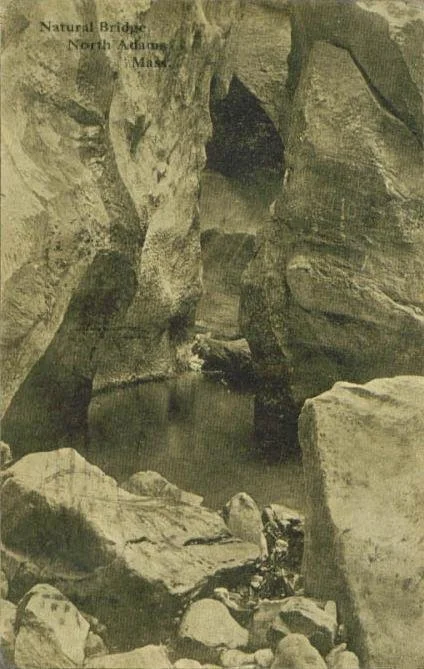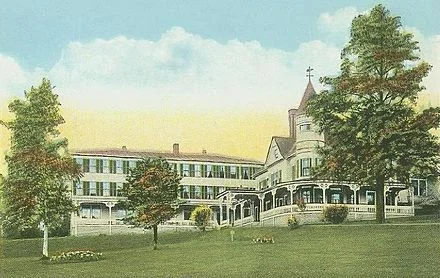
Compressed loves and hates
The Blackinton section of North Adams, Mass., in 1889.
In Natural Bridge State Park, a Massachusetts state park in North Adams. Named for its natural bridge of white marble, unique in North America, the park also offers woodland walks with views of a dam made of white marble, and a picturesque old marble quarry.
“The village viewed from the top of the hill to the westward, at sunset, has a peculiarly happy and peaceful look; it lies on a level, surrounded by hills, and seems as if it lay in the hollow of a large hand….It is amusing to see all the distributed property, the aristocracy and commonality, the various and conflicting interests of the town, the loves and hates, compressed into a space which the eye takes in as completely as the arrangement of a tea-table.
Nathaniel Hawthorne (1804-1864), on North Adams, Mass., in The American Notebooks (1838). North Adams, in The Berkshires, would become a thriving factory town. Manufacturing started to leave decades ago, and North Adams is now an arts center, particularly because of the Massachusetts Museum of Contemporary Art.
The funny people of Plymouth, New Hampshire
Sunset beyond the Plymouth Walmart. See the wind turbines on the ridge line.
”There's such an odd, eclectic group of people that make up the town of Plymouth, New Hampshire. I don't think I could avoid not coming out of there with a pretty good sense of humor.’’
— Eliza Coupe, actress and comedian
Plymouth is on the edge of the White Mountains and has long been a summer resort area, with such facilities as the late lamented Hotel Pemigewasset, whose latest version was demolished in the 1950s, to be replaced by the hideous scene at the bottom of this entry.
The hotel may be best known as being the place where famed writer Nathaniel Hawthorne died. Hawthorne had been in poor health, so in the spring of 1864 he took a trip to the White Mountains with his friend and Bowdoin College classmate, former President Franklin Pierce, to recuperate. He expired there on May 19, 1864.
Plymouth also hosts Plymouth State University and has a surprisingly large number of artists and visual artists.
Hotel Pemigewasset in 1922
'Thrusting aside the soil'
The Old Manse is an old house in Concord, Mass., famous for its historical and literary associations.
"I used to visit and revisit it a dozen times a day, and stand in deep contemplation over my vegetable progeny with a love that nobody could share or conceive of who had never taken part in the process of creation. It was one of the most bewitching sights in the world to observe a hill of beans thrusting aside the soil, or a rose of early peas just peeping forth sufficiently to trace a line of delicate green.''
-- Nathaniel Hawthorne, from Mosses from an Old Manse
In 1842, the novelist Nathaniel Hawthorne rented the Old Manse for $100 a year. He moved in with his wife, Transcendentalist Sophia Peabody, on July 9, 1842, as newlyweds and lived there for three years before they were being evicted for not paying their rent.
Ms. Peabody had previously visited Concord and met Ralph Waldo Emerson while working on a bas-relief portrait medallion of his brother Charles, who had died in 1836. She praised the town to Hawthorne. Before the Hawthornes' arrival at the Manse, Henry David Thoreau created a vegetable garden for the couple. In the upstairs room that Hawthorne used as his study, you can see affectionate sentiments that the two etched into the window panes.
'So pleasant an effect'
"There is no season when such pleasant and sunny spots may be lighted on, and produce so pleasant an effect on the feelings, as now in October."
-- Nathaniel Hawthorne






